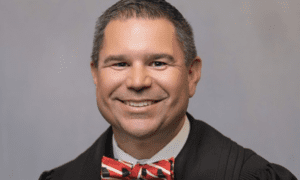The July 22 Republican runoff election for the District 4 seat on the Fayette County Board of Education is just two weeks away. To give voters the opportunity to hear from the candidates, The Citizen asked Jane Owens and Diane Basham to respond to seven questions with short answers of 100 words or less to each query.
Below are the questions and the responses from candidate Diane Basham.
1. Given that Coweta County operates a significantly larger school system (expenses for next year of $173 million compared to Fayette’s $170.5 million) and yet has a lower millage rate (18.59 mills), it appears on the surface that Coweta spends money more efficiently. What is your opinion on this? And at what point and under what conditions would you support a reduction in the millage rate to Fayette taxpayers?
Basham: “Comparing two school districts is, at best, a complex issue. Compared to Coweta County we spend more per student to maintain a lower pupil-teacher ratio, we have expanded programs for gifted and AP classes in the high schools and we have made a commitment to smaller populations in our high schools. Coweta has three (high schools) and Fayette has five,” said Basham. “These choices have been made with community support. Fayette County priorities are to continue to maintain the system quality, restore some austerity cuts and raise teacher salaries to a competitive level. Once these goals have been accomplished, I will support any millage rollback that can be afforded. However, we can certainly benefit from analyzing how Coweta and other county’s schools function. Furthermore, we should audit all positions in the school system to maximize our efficient use of resources. Since personnel costs make up almost 90 percent of our regular budget, we should always be looking for areas to be consolidated in order to streamline the operation of our system.”
2. What do you see as the role of a school board member?
Basham: “As a school board member I am entrusted with two of our community’s most important assets, their children and their money. Every child must be afforded the best educational experience to be career or college ready and to be prepared for their role as productive, responsible 21st century citizens. I will work closely with the school administration and other board members to continually review and adjust current programs to provide the needed rigor for raising student achievement,” Basham said. “Any new programs must be carefully studied before implementation. Research-proven ‘best practices’ and input from school administrators, teachers and parents must be used to ensure that tax dollars are spent in the most efficient and effective way. We must also work to maintain a competitive work environment for student success by retaining and recruiting quality personnel.”
3. Describe the areas of your background and competency in developing the school system’s budget.
Basham: “Before beginning my teaching career, I worked in the private sector for 15 years in the areas of management and finance. My responsibilities there included assisting in fiscal year budget development and forecasting, as well as managing my department’s strict compliance with the budget. As an economics teacher in Fayette County, I presented to the board on several occasions about issues with the system’s budget. I emphasized to my students the importance of fiscal responsibility. Each of my students was assigned a personal budget project as a practical experience to accomplish this goal. Sound fiscal management and being a good steward of the taxpayer’s dollars is one of the most important responsibilities of a board member. Although it is not the responsibility of a board member to implement programs, we can ask if a program is really worth the cost and whether it truly will be effective. All programs should be evaluated on an on-going basis,” Basham said.
4. Given the continued decline in student enrollment since 2007 (approx. 22,300 kids) compared to today (approximately 20,200), what do you see happening with school system enrollment and how will you respond to it?
Basham: “Over the past seven years the average student population in Fayette County has declined at a rate of about 300 students per year. If the current trends continue, I would expect enrollments to plateau or decline somewhat. Although population has increased, the demographics of Fayette County have also changed,” said Basham. “I am optimistic that we can reverse this trend as the county realizes the economic impact of Pinewood Studios, the establishment of colleges and universities, the announced manufacturing expansions and relocations and the potential for a surge in new jobs. More affordable housing and amenities need to be provided so Fayette County can once again be an attractive location for young professionals to live, work and raise their families. As a school system, it is absolutely essential that we watch enrollment carefully and base hiring decisions accordingly. Our goal is to continue the high rates of student achievement, cultural programs,and extra-curricular activities that have been the magnet that will lead families to live and work here.”
5. What is your philosophy on redistricting?
Basham: “Redistricting should occur as infrequently as possible with the fewest student and family disruptions. Students and their families create strong ties with friends, teachers and extra-curricular activities within their school. The school board must work collaboratively to maintain a clear line of communication with local and county officials, developers and real estate companies to have a distinct picture of how planned development will impact our schools. Because a change in schools disrupts lives, the school board must keep parents informed and formulate a long-term plan, with the input of stakeholders, so that families can be part of the process. As a school board, we have an obligation to offer all students a safe, healthy learning environment that over-populated schools simply cannot provide,” Basham said.
6. In terms of your political philosophy, to whom do you owe your first allegiance: school system employees, voters and taxpayers, or the children.
Basham: “Our children are our future. My first allegiance is always to the students we serve. My goal is, and always has been, to foster an appropriate learning environment for all our children. We owe it to every student who graduates from a Fayette County school to explore all avenues in order for them to be prepared to pursue the career of their choice. To ensure the best education for our children, we must recruit and retain competent employees. As a result, the voters/taxpayers are well-served by a school system that provides the best schools possible,” said Basham.
7. The final question dealt with the candidate’s response to a recent letter from a member of a parent booster group who made claims about Basham and urged parents to vote for Owens.
Basham: “Given my support of students, and my time as a teacher in Fayette County, it should be obvious that this information is inaccurate. Fine arts are exceedingly important. Many budding artists and actors find their passion in our fine arts programs. Music, drama, art and extracurricular activities are all vital to the development of well-rounded students and to suggest that I believe otherwise is simply false. Educational research supports my personal belief that the benefits of music and fine art programs reach far beyond the classroom. Students who have music instruction do better in math, have fewer discipline problems and show better time management skills,” Basham said. “Fayette County schools pride themselves on offering a comprehensive curriculum, one that includes core classes, fine arts programs and extracurricular activities. As a board member I commit to looking at all fine arts and extracurricular programs and making responsible choices. As additional funding becomes available, we must prioritize reinstituting programs that were eliminated due to austerity cuts.”
[Diane Basham, 65, is a 30-year resident of Fayette County who recently retired after 27 years teaching in the Fayette County School System.
Before her time in education she worked in the finance department with Micronics International. Prior to that time Basham worked in the hotel industry.
Basham graduated with a bachelor’s degree from Illinois State University. Her master’s and specialist degrees were earned at the University of West Georgia.]












Leave a Comment
You must be logged in to post a comment.